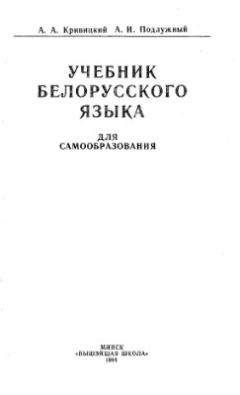Илья Франк - Английский язык с миссис Харрис, или платье от Диора
repercussion ["rJpW'kASqn], decent [dJsnt], knowledge ['nOlIG]
When such a powerful person was out of sorts or ill-humored, repercussions would ring far and wide. The crises which Mme. Colbert was suffering had to do with her husband Jules and the love, respect and affection for him which had grown over the twenty years they had been together. Dear, good, decent, clever Jules, who had more knowledge in one fingertip than all the rest of them in the Foreign Office, with their striped trousers and morning coats and political connections.
But one thing Jules lacked (но в одном /качестве/ Жюль испытывал недостаток), or rather two (или скорее в двух) — he had not the ability to push himself (у него не было способности продвигать себя; to push — толкать), and he had no political friends or affiliations (и у него не было политических друзей или связей; affiliation — прием в члены, присоединение). He had achieved his position (он достиг своего положения), beginning as a poor boy (начиная как бедный паренек), by brilliance and application (одаренностью и прилежанием; brilliance — блеск, яркость). Yet whenever there was a better or higher position opening (однако, всякий раз, /когда/ открывалась лучшая или более высокая вакансия) he was rejected in favor of someone of lesser intellect but greater affiliations (его отклоняли: «отвергали» в пользу кого-то с меньшим умом, но большими связями) who then from his new position of eminence used Jules' brains (который затем со своего нового высокого положения использовал умственные способности Жюля; eminence — высота; возвышенность; высокое положение; высокий чин) to conduct his post (чтобы руководить на своем посту). As his wife (как его жена), and herself an intelligent woman au courant affairs in France (сама умная женщина, /которая была/ в курсе событий во Франции), Mme. Colbert knew that many a difficult problem (мадам Кольбер знала, что многие сложные проблемы) had been solved by her husband's brains and intuition (были решены умом и интуицией ее мужа).
affiliation [q"fIlI'eISqn], favor ['feIvq], eminence ['emInqns]
But one thing Jules lacked, or rather two — he had not the ability to push himself, and he had no political friends or affiliations. He had achieved his position, beginning as a poor boy, by brilliance and application. Yet whenever there was a better or higher position opening he was rejected in favor of someone of lesser intellect but greater affiliations who then from his new position of eminence used Jules' brains to conduct his post. As his wife, and herself an intelligent woman au courant affairs in France, Mme. Colbert knew that many a difficult problem had been solved by her husband's brains and intuition.
Yet time and time again he had been passed over for promotion (однако снова и снова его обходили с повышением; to pass over — обходить/оставлять без внимания), time and time again his eager optimism and enthusiasm had been shattered (снова и снова его горячий оптимизм и энтузиазм были разрушаемы; to shatter — разбить вдребезги; раздробить; пошатнуть, расстроить /здоровье, экономику и т. п./; разрушать /надежды/). In the past year for the first time (в прошлом году впервые) Mme. Colbert had become aware of a growing hopelessness and misanthropy in her husband (мадам Кольбер узнала о /чувстве/ возрастающей безнадежности и мизантропии ее мужа; misanthropy — мизантропия, человеконенавистничество, нелюбовь и недоверие к людям). A man of fifty now (мужчина пятидесяти лет теперь), he felt he could look forward to nothing but the existence of a Foreign Office hack (он чувствовал, что он не мог ожидать ничего, кроме существования трудяги/рабочей лошадки Министерства иностранных дел). He had all but given up (но он не сдавался: «все что угодно, только не сдавался»; to give up — сдаться, уступить), and it broke her heart (и ей было больно: «это разбивало ее сердце») to see the changes in the man to whom she had given her devotion (видеть эти изменения в человеке, которому она отдала свою преданность).
promotion [prq'mquSqn], enthusiasm [In'TjHzIxzm], existence [Ig'zIstqns]
Yet time and time again he had been passed over for promotion, time and time again his eager optimism and enthusiasm had been shattered. In the past year for the first time Mme. Colbert had become aware of a growing hopelessness and misanthropy in her husband. A man of fifty now, he felt he could look forward to nothing but the existence of a Foreign Office hack. He had all but given up, and it broke her heart to see the changes in the man to whom she had given her devotion.
Recently (на днях) there had been a sudden death at the Quai d'Orsay (случилась внезапная смерть в Министерстве иностранных дел /на Кэ д’Орсэ — набережной Орсэ/); the chief of an important department had succumbed to a heart failure (глава одного важного ведомства стал жертвой сердечной недостаточности). Speculation was rife as to who would replace him (прогнозы/догадки распространились относительно того, кто заменит его; rife — обычный, частый, обыкновенный, распространенный; изобилующий; кишащий). Jules Colbert was one of those in line for the job and yet (Жюль Кольбер был одним из тех в списке /претендентов/ на эту работу, и все же)…
It saddened Mme. Colbert almost to the point of desperation (это печалило мадам Кольбер почти до отчаяния: «до точки отчаяния») to see how her husband's buoyancy from his younger days (видеть, как жизнерадостность ее мужа, свойственная ему в молодости: «из его более юных дней») struggled to break through the weight of pessimism (старалась пробиться через груз пессимизма) that experience had laid upon his shoulders (который жизненный опыт возложил на его плечи). He dared to hope again (он рискнул надеяться вновь), even against all of the political corruption (даже вопреки всей государственной коррупции) which would shatter his hopes (которая разобьет вдребезги его надежды) and this time leave him an old and broken man (и на этот раз оставит его старым и сломанным человеком; to break — ломать).
recently ['rJsntlI], failure ['feIljq], buoyancy ['bOIqnsI]
Recently there had been a sudden death at the Quai d'Orsay; the chief of an important department had succumbed to a heart failure. Speculation was rife as to who would replace him. Jules Colbert was one of those in line for the job and yet…
It saddened Mme. Colbert almost to the point of desperation to see how her husband's buoyancy from his younger days struggled to break through the weight of pessimism that experience had laid upon his shoulders. He dared to hope again, even against all of the political corruption which would shatter his hopes and this time leave him an old and broken man.
This then was the burden (итак, это было бременем) that Mme. Colbert carried about with her (которое мадам Кольбер носила /всегда/ с собой). She had helped her husband by working and taking financial strain off him (она помогла своему мужу, работая и избавляя его от финансовых затруднений; to take off — убирать, уменьшать; strain — натяжение; напряжение; нагрузка; to strain — натягивать; напрягать) and so had built herself into her position (и так утвердилась своем посту; to build — строить; основываться, расти) in the great dressmaking house (в крупной фирме по пошиву дамского платья; house — дом; фирма, организация). But she realized now that this was not enough (но она понимала теперь, что этого было недостаточно) and that in another way she had failed (и что в некотором смысле: «другом направлении» она потерпела неудачу). The wife of a diplomat or a politician must herself be a diplomat or a politician (жена дипломата или политика должна сама быть дипломатом или политиком), conduct a salon to which the great and the might-be great would be invited (управлять салоном, в который приглашались бы сильные мира сего и могущие стать сильными); she would wheedle (она бы угождала; to wheedle — подольщаться; пресмыкаться; обхаживать), flatter (льстила), intrigue (интриговала), even if need be give herself to advance her husband's interests (даже, если потребуется отдала бы себя, чтобы содействовать интересам своего мужа; need — нужда; потребность). Here was the ideal situation for such assistance (это была идеальная ситуация для такого содействия); a plum was ready to fall to the right man (доходное место было готово достаться нужному человеку; plum — слива; доходное место,«лакомый кусочек»; to fall — падать; доставаться) and there was no way (и не было способа) she could influence it into the lap of her Jules (/каким/ она могла бы повлиять, /чтобы она попала/ в подол = в руки ее Жюля). There was no one in those circles (не было никого в тех кругах) who cared so much as a fig for her or her husband (кто позаботился = сделал бы даже пустяк/мелочь для нее или ее мужа; fig — фига; винная ягода, инжир; нечто мелкое, незначительное; пустяк).
burden [bWdn], salon [sx'lLN], intrigue [In'trJg]
This then was the burden that Mme. Colbert carried about with her. She had helped her husband by working and taking financial strain off him and so had built herself into her position in the great dressmaking house. But she realized now that this was not enough and that in another way she had failed. The wife of a diplomat or a politician must herself be a diplomat or a politician, conduct a salon to which the great and the might-be great would be invited; she would wheedle, flatter, intrigue, even if need be give herself to advance her husband's interests. Here was the ideal situation for such assistance; a plum was ready to fall to the right man and there was no way she could influence it into the lap of her Jules. There was no one in those circles who cared so much as a fig for her or her husband.
This knowledge drove Mme. Colbert almost frantic with unhappiness (это знание делало мадам Кольбер почти безумной от несчастья) for she loved her husband (потому что она любила своего мужа) and could not bear to see him destroyed (и не могла видеть: «выносить видеть», как его уничтожали), but neither could she do anything (но также она не могла ничего поделать) to prevent it (чтобы предотвратить это) and break the ugly pattern of his being shunted aside (и разрушить ужасную череду: «шаблон», когда его постоянно отталкивали; pattern — шаблон; система; to shunt — переводить на запасной путь; отталкивать, перемещать) in favor of someone who had the right connections of money, family or political power ((в пользу кого-то, кто имел правильные = необходимые денежные, семейные или политические связи; power — власть). Nights she lay awake racking her brains for some means to help him (ночами она лежала без сна, напрягая свои мозги, чтобы /найти/ какие-то способы помочь ему; rack — дыба; to rack — вздергивать на дыбу; мучить, пытать; раздирать душу; напрягать; загружать, обременять). By day (днем) she could only become more and more convinced (она могла только больше и больше убеждаться) of the futility of her efforts (в тщетности своих усилий), and thus her bitterness was carried off into the life of her daily work (и таким образом ее горечь была перенесена в жизнь ее повседневной работы) and began to affect those about her (и начала затрагивать тех, /кто был/ рядом с ней; to affect — подвергать физическому воздействию, давлению; приносить вред, наносить ущерб). She was not unaware of the change in herself (она не могла не знать об этой перемене в себе; unaware — не знающий, не подозревающий /of — чего-л./); she seemed to be going about in some kind of nightmare (она, казалось, ходила в каком-то страшном сне) from which she could not awake (от которого она не могла проснуться).



